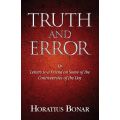We live in a day when the claim to offer truth and expose error is met with hostility. There is a reigning cultural insistence that all truth can be reduced to mere “personal” truths. Many in our churches sink into the sands of relativism, which chafe at the bedrock of “the faith once for all delivered” (Jude 3). What can a 19th century Scottish minister possibly offer to such a postmodern ethos? Pontius Pilate, during the interrogation of Jesus, uttered: “What is truth?” (John 18:38). Truth has always spread its light through a dark fog of error and ignorance in which the light is not easily perceived or readily received, so that Pilate’s vexing question has been restated in our own day.
For those in the Church who find their apprehension of truth to be somewhat dim and obscured, Horatius Bonar’s cogent letters will shed the light of the Gospel anew. Bonar recognized that truth is not mere mental assent, but wrought with moral and spiritual implications. More than anything, Truth and Error exhorts us to love the truth, and thereby models for us the needed labor of fanning its flame. The Apostle Paul thanked God for the Thessalonians who were “saved through belief in the truth” (2 Thess. 2:13). Perhaps more than ever, the discernment of truth has been given wounds from both within and without the Church; and this in turn has drawn many after vague notions of universalism or sheer indifference. Paul could likewise explain: “God sends them a strong delusion, so that they may believe what is false, in order that all may be condemned who did not believe the truth” (2 Thess. 2:11f). Those who ignore the matters Bonar discusses in Truth and Error risk wallowing in such delusion, but those who take up its pages will be alerted to the urgency of the task ahead.



